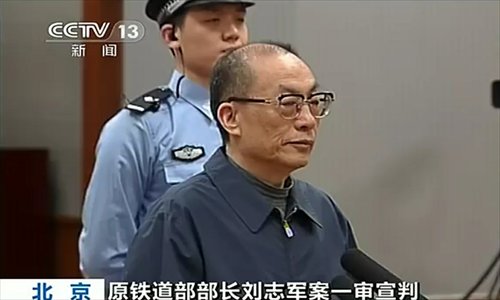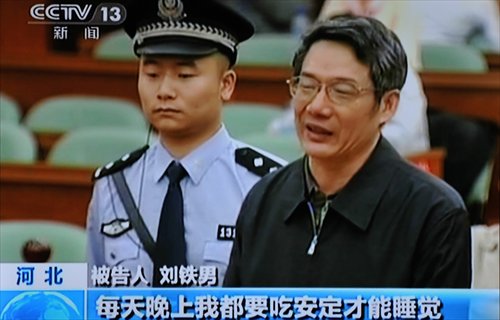

China’s top discipline watchdog to compile book

Liu Zhijun, former railway minister, was sentenced to death with a two-year reprieve on July 8, 2013. "As a farmer's boy, I could have been able to contribute more to China's railway cause …," he wrote in a confession letter.

Liu Tienan, former deputy chief of the National Development and Reform Commission, cries at a court hearing in 2014. Photos: CFP
"If I could go back, I would choose to keep my integrity… I used to be such a person. Corruption ruined myself, my child and my family," wrote Liu Tienan, the former deputy chief of the National Development and Reform Commission, in his confession.
Such confessions, written by Party officials probed or busted for discipline violations, will be compiled into a single book, the Communist Party of China (CPC) Central Commission for Discipline Inspection (CCDI) said in a report on its website on Tuesday.
"The confessions must be a 'vivid textbook' for Party members," said the report.
Writing confession letters is a practice with a long history in China and has been widely used by the modern justice system, Zhu Lijia, a public policy professor at the Chinese Academy of Governance.
Having a record of an investigation written from the point of the view of the person in trouble for corruption helps discipline inspection officials get feedback on the process and their anti-graft measures as well as to understand the mentality of corrupt officials, said Zhu.
Varied styles
Several confession letters written by officials busted for corruption are available on the website of the CCDI and jcrb.com, a website affiliated with the Supreme People's Procuratorate that began to publish such letters in 2006.
About one fifth of the 100 confession samples collected by the Jilin-based New Cultural Newspaper start with "I was born in a family of farmers," and expressions such as "I am the son of a farmer" have been used in many confessions including Su Rong's, former vice chairman of China's top political advisory body.
In general, confessions often express loyalty to the Party, regret over misconduct and usually conclude with pleads for light punishment, though the way these things are expressed can vary, being figurative or plain, emotional or rational, Zhuang Deshui, an anti-graft expert at Peking University, told the Global Times.
"I took whatever people gave, from a few thousand yuan to over 100,000 yuan ($15,240). I opened my hand but never thought I would end up with an inspection from the Party," wrote Shi Lianwen, the former director of Liaoning Radio and Television who was sentenced to life imprisonment in 2014.
"The Party made many efforts to raise me from a poor child to a senior official but my behavior returned kindness with ingratitude," wrote Song Yong, former vice chairman of the Liaoning Provincial People's Congress Standing Committee in Northeast China.
"Greed has made me a slave of money and a monster," said Song, who received a suspended death sentence in 2011 for taking bribes worth over 10 million yuan, according to the CCDI.
Most officials write the confessions when they are probed, tried, or in jail. The Xinhua News Agency reported that many officials who are being probed or tried write confessions in the hope that they will help them get a lighter sentence.
"With the confession, the procuratorate might see that they have a good attitude, so the judges might take a few months or even a year off their sentence," Liu Tao, a prosecutor in Guizhou Province told the Phoenix Weekly.
To ensure they manage to write a persuasive confession, some officials even copy others' admission of personal guilt.
Wang Guochang, former head of the Fujian Provincial Department of Environmental Protection repeatedly asked discipline inspectors to give him a sample confession he could copy, the China Discipline Inspection Daily reported in December 2015.
To warn and learnIn February 2015, the CCDI launched a special section on its website to publish the confession letters of corrupt officials after the anti-graft drive kicked off at the 18th CPC National Congress in 2012.
The section has published sections of eight letters as of press time.
The move came one month after Wang Qishan, head of the CCDI, requested that all officials who were found guilty of serious violations after the Party congress should be made to write confessions, in order for them to reflect on their mistakes and to provide a warning to others.
Separately, the Procuratorial Daily, a newspaper under the Supreme People's Procuratorate, has been publishing such confessions since September 2006 in a special column.
According to the Phoenix Weekly, corrupt officials' confessions have already been made into documentaries that are now being shown at educational seminars held for officials of all levels.
Confessions can help the disciplinary authorities conduct quantitative analyses and learn when and where violations occur most often and in which manner, as well as perform qualitative research into the reasons for corruption, said Zhuang.
 French girl ties the knot with Chinese boy
French girl ties the knot with Chinese boy Beijing Style: ready for bare legs
Beijing Style: ready for bare legs Century-old station sees railyway evolution
Century-old station sees railyway evolution Enthusiasts perform Kung Fu at Wudang Mountain
Enthusiasts perform Kung Fu at Wudang Mountain Stunning photos of China's fighter jets in drill
Stunning photos of China's fighter jets in drill Monk's mummified body to be made into a gold Buddha statue
Monk's mummified body to be made into a gold Buddha statue Former Chinese solider of the French Foreign Legion seeks wife online
Former Chinese solider of the French Foreign Legion seeks wife online Asia's longest and highest suspension bridge to open to traffic
Asia's longest and highest suspension bridge to open to traffic China's first interactive robot looks like a beauty
China's first interactive robot looks like a beauty Top 20 hottest women in the world in 2014
Top 20 hottest women in the world in 2014 Top 10 hardest languages to learn
Top 10 hardest languages to learn 10 Chinese female stars with most beautiful faces
10 Chinese female stars with most beautiful faces China’s Top 10 Unique Bridges, Highways and Roads
China’s Top 10 Unique Bridges, Highways and Roads Tech firms seen leaving Shenzhen
Tech firms seen leaving Shenzhen Diplomats should avoid public opinion spotlight
Diplomats should avoid public opinion spotlight Authorities urged to take action on fake universities that continue to proliferate
Authorities urged to take action on fake universities that continue to proliferate Refugees from Vietnam and their offspring grapple with lack of citizenship after more than three decades
Refugees from Vietnam and their offspring grapple with lack of citizenship after more than three decadesDay|Week